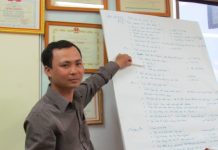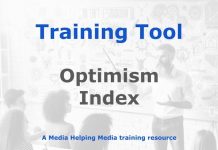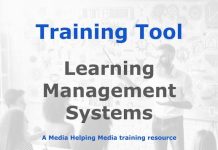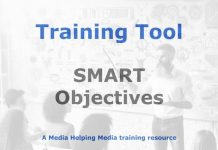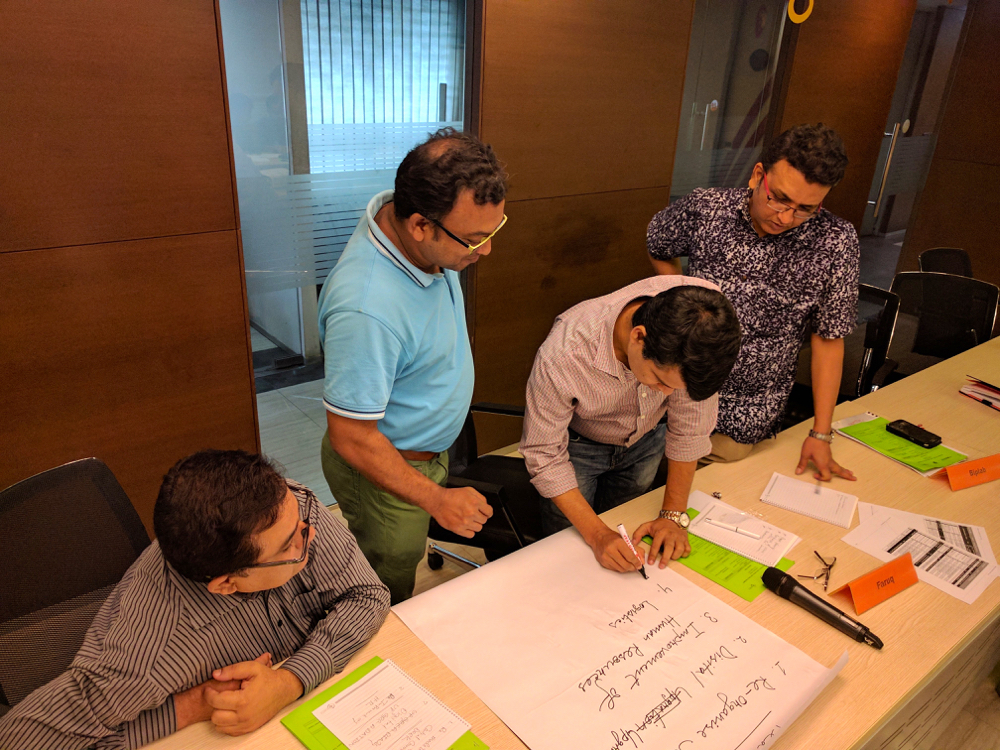
Media assistance is a two-way process in which providers have as much to learn as they have to give, according to those on the receiving end.
Media Helping Media asked a number of people who have run media development projects what they felt needs to change. The replies came from The Russian Federation, Indonesia, Azerbaijan, Sri Lanka, Lebanon, Macedonia, Ukraine, Bhutan and Nepal and make up a challenging list of tips for those who try to help media in need.
Russian Federation
Maria Eismont is the Director of Russian Independent Print media programme of the New Eurasia Foundation
If you think you know exactly what to do – don’t even start. Better spend the money for holidays in Bali, or fund surgeries for ill children. If you really want to help other countries with media freedom, prepare to learn as well as teach.
You may represent a country with centuries of independent media history and you may be going to work in the country with no history of media freedom at all – there will be things to learn for YOU from THEM.
The world is as much global as it is diverse. Local knowledge is crucial. Words have different meanings in different cultures. Be sure you remember it when you promote YOUR freedom of speech, YOUR idea of independent media, or YOUR understanding of media business.
Decide, what is your goal, apart of spending donor’s money of course. Think of the result you want to achieve: do you want to help the media companies to develop and prosper or to help citizens receive better, deeper and more balanced information? Sometimes these things go together, sometimes they don’t.
Even in the West good business does not necessarily means good content quality, and visa versa, while in the developing world, where good business often requires good relationship with the authorities it may be even more conflicting.
Be generally skeptical of the media assistance success stories you’ve heard or read about. Some of them are pure invention of the report writers; others are great but may not work everywhere.
If you want to know more about the experience of other media assistance projects, don’t rely on the reports – they are usually favourable to any results – go and find out about their work on the ground.
Be generally skeptical of the media assistance success stories you’ve heard or read about. Some of them are pure invention of the report writers; others are great but may not work everywhere.
Be flexible. Don’t stick by the initial project design; be ready to change tactics and even sometimes strategy itself. Not only may you be mistaken in the stage of project design, but the situation may change – and in many developing countries it actually does change quite often and very fast.
Reporting numbers mean very little, and intelligent donors know that well themselves (although they will still require to be provided with quantitative figures in the reports).
It doesn’t matter how many journalists you will train, it matters HOW you’ll do it and WHAT they will be able to PRODUCE after the training; it doesn’t matter how many companies you’ve assisted, what matters is the QUALITY of your assistance.
Be prepared for the set-backs and failures, but don’t try to present them as a success: even if that works in the immediate run with your donors, it will eventually lead to developing wrong strategies and raising mistrust in the things you promote.
Personalities matter. Find the RIGHT PEOPLE and link them to one another, make them feel they are not alone in their will and capacity to provide good investigations and to cover stories that matter and inform rather than entertain.
It will be better if the RIGHT people you find are in the RIGHT POSITION to influence the editorial strategy of their media. Without editors and senior media managers on your side you will achieve much less then you could. Remember: journalists you train will then return to work under their guidance.
Don’t be afraid to talk about ethics, although be prepared that people you will be assisting may prefer to discuss business strategies. If you think you have no right to raise this issue as a foreigner – go to the first sentence of the point 1. Talk about professional ethics rather than about democracy and freedom of speech in general. And don’t forget to criticize your own country – especially as it is not that difficult to find negative examples.
Indonesia
Heru Hendratmoko is the Production Director/Chief Editor of radio news agency KBR68H and President of the Alliance of Independent Journalists (AJI Indonesia) 2005-2008.
Observe the macro context in the country where you will take an action. Ask independent organisations such as NGO’s, journalists union/association about what is happening. Gather information as much as possible. Of course you do not need use it all, but the complete information and data which you gathered will help you to understand the situation much better.
Check and recheck all attributes such as name, age, city, rank of public position, etc
Ask what can you do for them to help. The kind of help may be given with various forms, from financial aid, technical assistance, or high level advocacy such as sending international delegation. Or just a simple help such as sending alerts or a public statement.
If you want to make a public statement or press release, make sure that all of its content will not endanger your contacts/clients. In some cases, you’d be better not to mention certain names, except the organisation’s name, to avoid attacks on individuals. Be sure to discuss this issues with your contacts who could be at risk before taking any action.
Azerbaijan
Gulnara Akhundova formerly the Acting Head for Azerbaijan Media Center
While often ignored by international organisation, social factors are crucial. Ensure you are aware of these.
Sometimes it looks so easy to leave your integrated news room with dozens of people working there and travel to a country in transition, where journalists have limited access to the internet and poor office facilities, and try to teach those journalists the standards and working practices enjoyed by the BBC or CNN.
It’s not and what you offer needs to be relevant to the needs of those you are addressing.
Journalists in transition countries are often working more on enthusiasm than for money (they do not earn much). This also needs to be considered.
When there is limited freedom of expression or poor access to information one cannot expect professional media reports.
That’s impossible. So there is need for integrated approach, with a programme aimed not only at boosting a journalist’s skills but also at promoting freedom of expression and pluralism.
Sri Lanka
Nalaka Gunawardene is Director and CEO of TVE Asia Pacific
Media operates as a business, not a charity: All media organisations have a social responsibility, but that must be balanced with its commercial viability. This is so with state, corporate or community-owned media. Bankrupt media can’t serve any public interest.
Media is a plural: Media is a basket term for entities with enormous diversity and variability. One size does not fit all, no matter how well intended. It’s crucial to understand before engaging any media.
Follow the eyeballs: If you want the biggest bang for your limited buck, start with the mass market end of media such as FM radio, tabloid newspapers and music TV channels. Leave your broadsheet/classical prejudices out of investment decisions.
Take it easy: Audiences need entertainment as much as information and education. Supporting quality entertainment in the media is just as important for the public good as nurturing investigative journalism or advocating media freedom.
Sparks of hope: The real world is not an all-or-nothing game. Find oases of innovation and resilience and nurture them to survive and grow in turbulent times. Back media underdogs of today who can become fierce watchdogs of tomorrow.
Lebanon
Wadih Tueni is the Information Technology Manager – An Nahar Online
Understand the culture (the people) in other countries. Don’t try to apply Western ideas and the way you do things as some of those ideas won’t work.
Spending some time observing the country’s media you wish to help will assist you in understanding the issues they face.
This will be of great benefit for you and for them.
Finance the project for a limited time (equipment, training etc) making it clear that your aim is to help and help push them – but make it clear that you are not there to offering continuing financial support.
Create a model that can generate revenue otherwise it’s a waste of time and money. A failure to creating such a model might cause additional problems for the media you wish to help, especially after investing (even partially) in a new project.
Nepal & Bhutan
TP Mishra is the Founder/President of the Bhutan Chapter of Third World Media Network (TWMN)
The media development organisations offering the help need to make sure that it is being used properly. In some cases, the media development funds don’t reach those in genuine need of the support.
Sometimes those running the media-related organisations misuse the funds, or show favouritism in the way training and seminars are run.
Often, those in mainstream media are the main beneficiaries when there are more worthy needs to be addressed.
In transition countries and areas where media freedom is under threat, many publications and media organisations are closing down. Western media development organisations have more or less failed to help them in their hour of need.
In many countries there are no academic courses or training institutions where people interested in journalism can sharpen their skills and knowledge. It would be good if media development organisations focus on this. Making available training resources for real journalists would be a great help.
In some cases, the media development funds don’t reach those in genuine need of the support.
Macedonia
Risto Popovski former editor-in-chief and owner of the MAKFAX News Agency and now a media strategist.
Macedonia’s experience from 20 years of transition, which unfortunately seems indefinite, is far from positive. The old weaknesses reoccur, new problems pile up, and instead of having these problems solved, the problems become even more complicated and deep.
The governments always want to seize control of media. This is an attribute of every government regardless of political orientation and (non) democratic capacities. Only the methods seem different – from brutal attacks, direct threats or hidden pressures to perfidious, illegal or formally legal methods of economic pressure aiming at taking over the control of public say.
Direct or hidden pressures, the latest and also the most serious are dividing the journalists into patriots and traitors. This division has been inspired by the government, which also divides the citizens accordingly, and such a division is being promoted through the media and journalists close to government and through its apologists and spokespersons.
The influence is also closely linked with the media ownership structure, a theme that requires a detailed analysis. It would be enough to say that political party leaders are owners of the media, and certainly not as title-bearers. Media owners are business people with political ambitions or business people who use media to safeguard themselves and their corporate interests. And they do so in cooperation with the government.
It should be noted that foreign organisations that work to support media have not been present in Macedonia for more than two years. This means there is no financial assistance and no training. The government controls the media with economic instruments.
The upmost objective of media-support organisations, providing that they intended to work in Macedonia again, should be to encourage foreign media to enter the media space as investors. It is the only way to ensure economic stability and freedom of media. EU funds, donors’ funds and investment funds could be used for this purpose.
The entry of foreign investors would directly improve the situation in terms of management and the promotion of economic freedom of the media. This is one of the media’s blind spots. Therefore, training is needed, serious and lengthy training, and sending expert consultants.
Training of young journalists is essential, and it should run on a frequent basis, or permanently if it is possible. The training should include the basic techniques of journalist language and expression, specialisation in various fields, investigative techniques. The main goal is to ensure that young journalists learn to use their head, not their editor’s head.
The need for professional and social protection of journalists is more than indispensable. The Association of Journalists of Macedonia needs to enlarged with new members, and it must step up and expand the scope of activities. There is no union of journalists in Macedonia. To be more precise, there is a union but on paper only.
The main goal is to ensure that young journalists learn to use their head, not their editor’s head.
Ukraine
Vitaliy Moroz is the head of new media department – Internews Ukraine
To expand the target audiences for journalism training to civic journalists and bloggers. Media development is important for citizen journalism as well.
To be adaptable to changes while implementing the initial agenda. Let changes happen! During the project implementation new interesting and creative ideas can be found which will strengthen media development. The project needs to be flexible enough to incorporate these.
Pay more attention to local conditions and find local successful case studies. Many countries have successful case studies in the area media development, those offering the training should not turn a blind eye on these but should rather build on them.
Focus not on media organisations but rather on establishing a favourable environment for journalists to work in. Media professionals often changes their posts. But if you work in informal groups, based on trust, a flow of new knowledge and journalist solidarity emerges and those who attend can do even more beyond the boundaries of their office.


